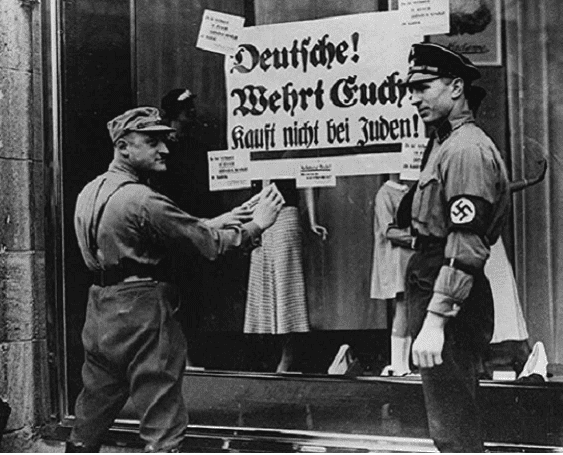Thank you to the European Parliament Working Group on Antisemitism for their open letter regarding the upcoming annualCarnival in Aalst, Belgium.


Thank you to the European Parliament Working Group on Antisemitism for their open letter regarding the upcoming annualCarnival in Aalst, Belgium.



This week I spent a lot of time going to events marking the Shoah in Brussels. They were, rightly and fittingly, solemn occasions. But here’s the thing: at every event, I found my fellow Jews talking together, smiling, sharing stories and there was even the odd joke or two.
Even at this darkest of commemorations, there was life and a celebration of the deep bond between us that transcends the shared pain and history. And it stood in stark contrast to the others present who were sombre faced and bore the weight of history in a very different way.
It seemed to me that the reminder to stay positive and rejoice in your Judaism that I tried to leave you with last week needn’t have been said, as it was clearly and demonstrably in evidence.
Because when you think of it, and you delve a bit deeper into our faith, the reason becomes clear: Joy (Simcha), is our central artery, feeding our heart and mind and driving us forward.
Moses after leading us through trying times, through hardship, rebellion and our complaining, understood us well when he said that it is our capacity for joy that gives the Jewish People the strength to endure.
Explaining to a non-Jew our holidays often ends with the cliché “they tried to kill us, let’s eat”, but this throwaway comment masks a more fundamental truth.
Let’s pick a holiday out at random…Sukkot for instance.
On Sukkot we leave the security and comfort of our houses and live in a shack exposed to the wind, the cold and the rain. Yet we call it zeman simchatenu, “our season of joy”.
Try another: Purim.
On the face of it a deeply depressing story, and yet we overcame, and boy, do we celebrate!
Time and time again, throughout our texts, we are enjoined to celebrate life, to rejoice.
Now either we are a bunch of deeply weird people who seem to thrive on adversity, orsomething deeper is going on here. You don’t need to guess what side I’m going to lean on. But let’s dwell on the ‘weird’ idea for a minute.
The founder of the Chassidic movement was once asked: “Why is it that Chassidim burst into song and dance at the slightest provocation? Is this the behaviour of a healthy, sane individual?”
The Baal Shem Tov responded with a story about a deaf man coming across a group of townspeople dancing to a musician that he hadn’t seen, and he thought they had gone mad.
The point is, without the context, such expressions of joy can appear disconcerting or perplexing.
Our context runs deep. We are commanded to Love the Lord our G-d with all our heart and all our soul and all our might. Moses as we touched upon earlier put Joy at the heart of Judaism (even as he was reading out the curses), and our Mitzvot? Well, the concept of simcha shel mitzvah, the “joy of a mitzvah,” has always been part and parcel of Jewish teachings.
Rabbi Lord Sachs, as eloquent as always, once told a story that toward the end of his life, having been deaf for twenty years, Beethoven composed one of the greatest pieces of music ever written, his Ninth Symphony. It became the West’s first choral symphony. The words he set to music were Schiller’s Ode to Joy.
Now, Ode to Joy, as any Europhiles reading this will know, is the anthem for the European Union. And Rabbi Sachs story came to mind as I was looking at the European flag at one of the events.
Because looking around the room, looking at my fellow Jews smiling, living, rejoicing in their Judaism at this tragic commemoration, and contrasting it with the others present, underlined to me not only the context I was just talking about, but how each of us, each Jew, has, as Rabbi Sachs alluded to, their own ‘ode to Joy’ within them, an ode that to those who are deaf to it might indeed appear odd, but to us comes not as second nature, but instead as the primary essence of our being.
Rabbi Menachem Mendel of Lubavitch wrote that “The Baal Shem Tov wiped away tears from the Jewish people. He worked hard to ensure that every Jew would be happy simply because he is a Jew.”
There’s still a lot more work to be done on this by all of us, but looking around the room at those various events, it was clear to me that the joy of being a Jew remains the ‘perfect defeat’ of the Holocaust, and a reminder, if one were needed, of what a beautiful thing it is to be Jewish.
We must always continue to go out with Joy.


Every Day during the Corona crisis our Advisory Board Member Chief Rabbi Binyomin Jacobs (NL) writes a diary, on request of the Jewish Cultural Quarter in Amsterdam, which is published on the website of the NIW, the only Jewish Dutch Magazine. Rabbi Jacobs is the head of Inter Governmental Relationships at the Rabbinical Centre of Europe. We will be regularly publishing a selection of his informative, sometimes light hearted, but always wise pieces.
For our Dutch readers you can follow the diary every day at NIW home page: https://niw.nl
Column NIW 38 GB
Sara wants to tell her husband something positive and something negative. What do you want to hear first, she asks him? Start with the good news, her husband replied. Well, Sara enthuses, your Lexus’airbags worked very well. After two weeks holiday of writing my diary, I also have something positive and something negative to say. I'll start with the negative. I had to go to England for a few days. The reason why is irrelevant, but I want to share the corona bombardment surrounding this trip. The ferry ticket was easily booked, but then the test circus started. I checked online which test is required to cross the sea. €130 PCR. Afterwards, the test of €39 turned out to be sufficient. I had to be at the test site at 11:05 am, preferable not earlier. I was there at 11:04, but had to queue until 12:15! Two days later, after lengthy paper statements about testing, whereabouts and quarantine, I was in London. Four times a day I got a call from the local authority asking how I was feeling and where I was. They also send inspectors to check us at the door every other day. And then back home again. I expected the return journey to be easy as I am Dutch and fully vaccinated. Mais non! I was bombed by text, WhatsApp and email by the Ferry company. I had to have an urgent reason, which officially falls under the exceptions, to be allowed to return home. My full vaccination was not recognized as I am entering Holland from England and I had to have a negative PCR test less than 24 hours old. The latter was a difficult one, because my ferry left at 11 p.m. So, I could only go to a test location the next morning, on the day of departure, but I would receive the results after 24 hours, not earlier. I was quite upset about it. It seemed like mission impossible. After a few days in England and five tests with negative results, I was back in Holland. At the border I was kindly welcomed by our Royal Military Police. I just had to show my ID. No test results and not even my app showing that I’m vaccinated. That friendly “welcome back to the Netherlands and have a nice” made me forget all threatening emails, text messages and WhatsApp’s in no time and therefore my quarantine after returning passed without any emotional problems. Which shows the importance of a few kind and
friendly words!


It’s a challenging time for Jewish communities in Europe. Anti-Semitism is on the rise as populism and the politics of the lowest common denominator are gaining traction. Our communities often need round the clock protection and our practices and customs such as keeping Kosher are under pressure from increasing political interference.
| Cookie | Duration | Description |
|---|---|---|
| cookielawinfo-checkbox-analytics | 11 months | This cookie is set by GDPR Cookie Consent plugin. The cookie is used to store the user consent for the cookies in the category "Analytics". |
| cookielawinfo-checkbox-functional | 11 months | The cookie is set by GDPR cookie consent to record the user consent for the cookies in the category "Functional". |
| cookielawinfo-checkbox-necessary | 11 months | This cookie is set by GDPR Cookie Consent plugin. The cookies is used to store the user consent for the cookies in the category "Necessary". |
| cookielawinfo-checkbox-others | 11 months | This cookie is set by GDPR Cookie Consent plugin. The cookie is used to store the user consent for the cookies in the category "Other. |
| cookielawinfo-checkbox-performance | 11 months | This cookie is set by GDPR Cookie Consent plugin. The cookie is used to store the user consent for the cookies in the category "Performance". |
| viewed_cookie_policy | 11 months | The cookie is set by the GDPR Cookie Consent plugin and is used to store whether or not user has consented to the use of cookies. It does not store any personal data. |